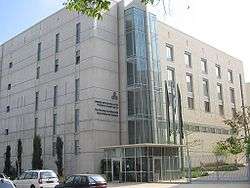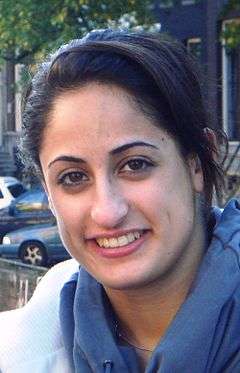Open University of Israel
The Open University of Israel (Hebrew: האוניברסיטה הפתוחה, Ha-Universita ha-Ptuha) is a distance-education university in Israel. Its administration center is located in the city of Ra'anana. As of 2015-16, the Open University had around 46,200 students.[1]
האוניברסיטה הפתוחה | |
 | |
| Type | Distance education Public |
|---|---|
| Established | 1974 |
| Budget | $150 million |
| Chancellor | The Rt. Hon. Lord Woolf |
| President | Professor Mimi Ajzenstadt |
| Vice-Chancellor | Abraham Ginzburg |
| Principal | David Klibanski |
| Vice-Presidents | Ora Limor |
| Students | 46,200[1] |
| Location | , 32°11′19.21″N 34°53′16.09″E |
| Website | www.openu.ac.il |
 | |
The university has more students than any other academic institution in Israel, coming from all over the world. The university is accredited to award undergraduate and postgraduate degrees, diplomas and certificates.
History
The Open University of Israel was conceived in 1971 and founded in 1974, modeled after the UK's Open University. The first semester of studies commenced on October 17, 1976. In 1980, the Open University was officially recognized as an institute of higher learning in Israel, and was accredited to award undergraduate or bachelor's degrees (BA). In 1982, 41 graduates were awarded BA diplomas at the university's first diploma ceremony.
By 1987, the university had 11,000 students and offered 180 courses. The university grew rapidly and by 1993, it had 20,000 students and 300 courses, and 405 new graduates. Then, in 1996, the university launched its postgraduate program offering courses towards a master's degree (MA). By 2002, the university had grown to 36,710 enrolled students and by 2003, more than 13,000 people had graduated the university with an academic degree.
Nehemia Levtzion was President of the university from 1987 to 1992. Menahem Yaari was the President of the Open University of Israel from 1992 to 1997, followed by Eliahu Nissim from 1997 to 2003.[2][3] In 2003 Gershon Ben-Shakhar became President. From 2008 to 2013, Hagit Messer Yaron was President of the university. In 2013, Jacob Metzer became President of the school. Mimi Ajzenstadt became President in 2018.
In 2010, the Open University began offering online courses taught in Russian. Students could enroll worldwide for 24 courses, most of them with Israeli or Jewish content. According to the online program, examinations can be held at Israeli consulates and Jewish Agency offices around the world.[4] Mimi Ajzenstadt is the President of the university.
Undergraduate studies


The Open University is open to anyone who wishes to study towards a bachelor's degree, without any prerequisites or screening process. However, the Open University still has high standards and demands academic achievements from its graduates. Another way in which the Open University is open is in the study path it offers to its students. When enrolling in the university, the student does not need to decide the primary focus of his or her degree, nor to determine in advance the pace of the degree (how many years the studies will take). In fact, it is possible to take only a single course or several courses without receiving a degree, or to take several courses per semester, until finally enough courses relevant to a certain academic area have been taken to be eligible for a degree.
To achieve these goals, the Open University employs distance education. The university has no single central campus, or rigid schedules, making it especially well-suited to those who are preoccupied with a job, army service, or their family.
The most important aspect of studying in the Open University is self-study from books. Each of the university's courses has a specially-prepared book with the course material and exercises, from which the students study on their own. The Open University's books and teaching aids have become quite popular in Israel's other universities and colleges as well.
To supplement the self-study, there are occasional group meetings, where the students can ask the teacher questions about the material, and talk to other students who take the same course. These meetings take place throughout Israel, and are optional to attend. The students can also use the university's Internet site ("TELEM") to communicate with the teachers or with other students. Some courses also feature video cassettes, multimedia CDs, and other audio-visual aids. Recently, video-conferencing technology has also enabled viewing a real-time lecture without the students all coming to a single campus. For each course, students must complete several required assignments, and take a final exam. To obtain a degree, students must participate in one or more seminar courses, depending on the academic program. The examination of seminar papers is carried out by academic staff members of Israel's universities.
Graduate studies
The Open University also has master's degree programs for some of the areas it teaches, but they are not open to everyone and do have acceptance criteria. At present, the university does not offer doctoral programs.
Affiliation with other universities
The Open University, together with the other Israeli universities, has reached agreements that enable students to begin their undergraduate studies within the flexible framework of the Open University and after taking a cluster of courses, decide whether they would like to complete their degree at the Open University, or transfer to another institution.[5] The courses studied at the Open University will shorten the duration of degree studies at the other academic institution.
Since 2007, the transfer options are available to:
- Tel Aviv University: Faculty of Humanities; Faculty of Social Sciences (School of Economics); Faculty of Engineering
- Hebrew University of Jerusalem: Faculty of Social Sciences (Department of Economics, Department of Sociology and Anthropology); Faculty of Agricultural, Food and Environmental Quality Sciences in Rehovot; Computer Science Department.
- University of Haifa: Faculty of Humanities; Faculty of Social Sciences (Department of Economics)
- Ben Gurion University of the Negev: The Faculty of Engineering Sciences (Computer Science); The Faculty of Humanities and Social Sciences (Department of Economics), The Department of Behavioral Sciences
- Bar-Ilan University: The Faculty of Social Sciences (The Department of Economics)
- Technion - Israel Institute of Technology: 14 faculties
Notable alumni
- Vladislav Bykanov (born 1989), Olympic short track speed skater
- Yael Dayan, politician and author
- Yuval Freilich (born 1995), épée fencer, 2019 European Epee Champion
- Yarden Gerbi, world champion and Olympic bronze medalist judoka
- Sharren Haskel, politician
- Zion Kenan, former Chief Executive Officer of Bank Hapoalim
- Itzik Kornfein, goalkeeper
- Ashmoret Mishal, ultramarathoner and physical coach
- Rivka Ravitz, chief of staff to President of Israel Reuven Rivlin
- Ilya Sutskever, chief scientist of OpenAI, also co-inventor of AlphaGo, and TensorFlow
See also
- List of universities in Israel
References
- "Statistic: More students in college and university". Israel National News. Retrieved 2020-02-01.
- "Prof. Menahem E. Yaari" (PDF). Israel Academy of Sciences and Humanities.
- "Distance Education in the High-Tech Era". UNESCO Courier. February 12, 1996 – via Google Books.
- Dattel, Lior (April 2, 2008). "Open University pioneering courses for overseas Russians, by Internet". Haaretz. Retrieved September 29, 2011.
- "Requirements for all Bachelor's degrees". E.openu.ac.il. Retrieved September 29, 2011.
External links
| Wikimedia Commons has media related to Open University of Israel. |
- Open University of Israel Web site
